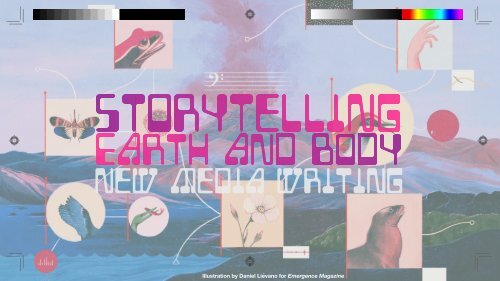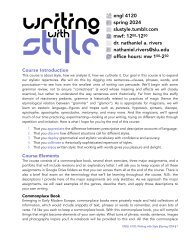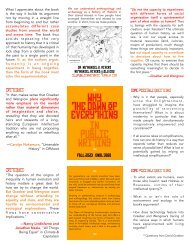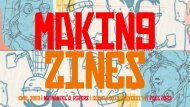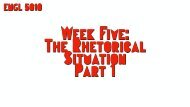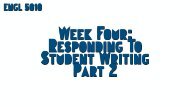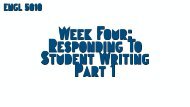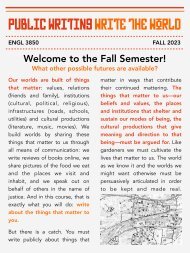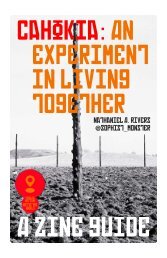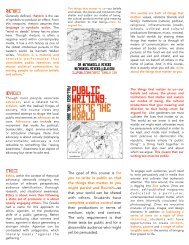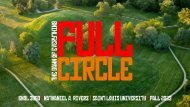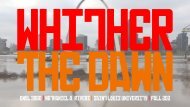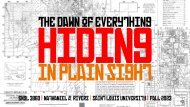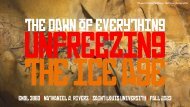ENGL 4010: Storytelling Earth and Body (SP23)
Create successful ePaper yourself
Turn your PDF publications into a flip-book with our unique Google optimized e-Paper software.
<strong>Storytelling</strong><br />
<strong>Earth</strong> <strong>and</strong> body<br />
New media writing<br />
Illustration by Daniel Liévano for Emergence Magazine
ingold<br />
“Someone who knows well is able to tell. They<br />
can tell not only in the sense of being able to<br />
recount stories of the world, but also in the sense<br />
of having a finely tuned perceptual awareness<br />
of their surroundings” (162).
We tell because we can tell. We have all probably<br />
Rivers<br />
said at some point, “I can tell that you’re upset,”<br />
or, more environmentally, “I can tell that it’s about<br />
to rain.” Telling in this instance is a practice of<br />
discerning, noticing or sensing. To tell is to be<br />
tuned in to what is going on.
Rivers<br />
We have also all promised, “I will tell you about it<br />
later,” or even enticed, “do I have a story to tell to<br />
you.” Telling here is to describe.
Rivers<br />
It is equally important to note that in poker a tell<br />
is an unconscious physical gesture that gives<br />
one away to others. To have a tell is to physically<br />
disclose something about your state of mind or at<br />
least the quality of your h<strong>and</strong>.
Rivers<br />
Tells <strong>and</strong> telling attune <strong>and</strong> articulate us to one<br />
another <strong>and</strong> to the world at large, <strong>and</strong> they do so<br />
even before we have even begun to tell.
Rivers<br />
We tell here so that others might tell elsewhere.
Vasudevan et al.<br />
How can storytelling, as an alternate mode of<br />
theorization, help us resituate contemporary<br />
planetary crises within longer histories <strong>and</strong> plural<br />
underst<strong>and</strong>ings of our relations with earth?
Vasudevan et al.<br />
Anticolonial feminist storytelling alters the<br />
spatiotemporal scales through which<br />
planetary crises are understood by centering<br />
the relationship between body <strong>and</strong> l<strong>and</strong>.
Vasudevan et al.<br />
<strong>Storytelling</strong> is how people make sense of the<br />
world <strong>and</strong> our place in it, an iterative process of<br />
interpreting reality through observation <strong>and</strong> the<br />
exchange of ideas.
Vasudevan et al.<br />
storytelling embraces the complexities <strong>and</strong> contradictions of<br />
lived experience, generating grammars at once prosaic <strong>and</strong><br />
revelatory, textured by everyday realities even as they<br />
speculate about “the nature of life.” […] “stories, unlike data,<br />
contain the affective legacy of our experiences. They are a felt<br />
knowledge that accumulates <strong>and</strong> becomes a force that<br />
empowers stories that are otherwise separate to become a<br />
focus, a potential for movement.”
Vasudevan et al.<br />
In the context of planetary apocalypse, storytelling can<br />
reanimate scholarship as an anticolonial practice<br />
grounded in wonder (McKittrick 2021). Stories express <strong>and</strong><br />
enable certain forms of relations (<strong>and</strong>/or domination), which in<br />
turn generate our subjectivities, behaviors, <strong>and</strong> knowledges. We<br />
turn to storytelling to reimagine our collective sense of self<br />
through profound interconnection with one another <strong>and</strong> our<br />
nonhuman relations.
The <br />
Franklin expedition
Mystery of a Victorian-era wreck in Arctic waters. BBC News, 2021
Audio from “The Inuit <strong>and</strong> the<br />
Franklin Expedition” by Craig Baird,<br />
Canadian History Ehx.<br />
Illustration of Inuit people outside<br />
of explorer Francis Leopold<br />
McClintock's (1819-1907) igloo.<br />
McClintock was looking for the<br />
remains of Sir John Franklin<br />
(1786-1847) <strong>and</strong> his 1845 expedition<br />
crew to the North American Arctic.<br />
Reproduction of a print from the 19th<br />
century.
Vasudevan et al.<br />
These generative offerings provide paths forward in<br />
the moment of planetary crises in which we are living;<br />
we must dismantle the dominant story <strong>and</strong> proliferate<br />
stories that tell otherwise if we are to survive <strong>and</strong><br />
thrive.
Vasudevan et al.<br />
Weaving stories through the grammars <strong>and</strong> practices<br />
offered by these anticolonial feminist genealogies, we<br />
must animate our imaginations to lead us out of the Manas-Human<br />
toward homo narrans, the storytelling human<br />
(Alagraa 2018); we must embrace the expansive<br />
relationalities that make us already more than human.
<strong>Storytelling</strong><br />
<strong>Earth</strong> <strong>and</strong> body<br />
New media writing<br />
Illustration by Daniel Liévano for Emergence Magazine


